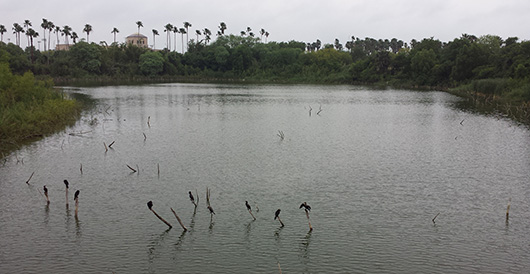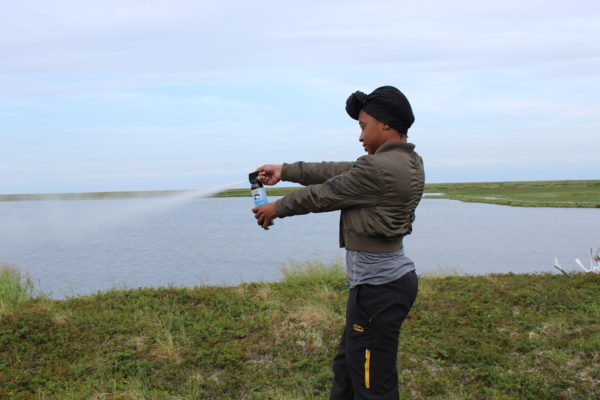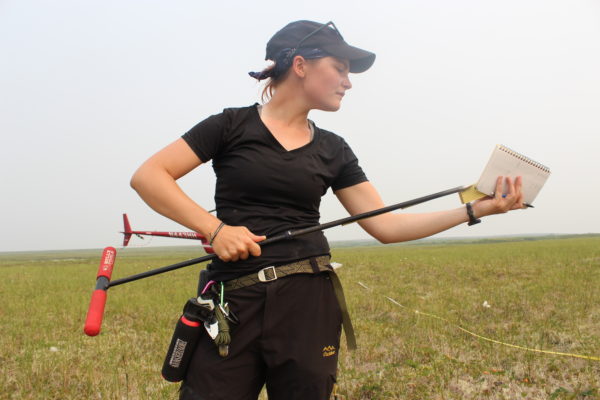I have always been very interested in ecology. However up until recently I didn’t know how to pursue my interests, and I had never been encouraged to do so. During one of her Biology lab courses, Dr. Heather Alexander provided resources and encouragement that gave me further motivation to pursue my interests. My enthusiasm and fascination for ecology were stimulated through discussions about the research she has conducted during her past summers in Siberia and about her plans for the upcoming summer. Honestly, being part of this type of ecological research seemed very out of reach until Dr. Alexander encouraged me to apply to The Polaris Project. Being in The Polaris Project has opened my eyes to the many opportunities that are out there for the taking. As young scientists, we have to do our part and work hard to achieve our goals.

Oxbow lake, or resaca, at the University of Texas Brownsville campus.
For me, being part of The Polaris Project is a huge deal. I am Mexican-American therefore I grew up in a culture where families are very close. We tend to put each other before anything else in our lives. We are very strong in this way, even if we don’t exactly get along with someone in our family we still look out for each other. A side effect of a community this close is that taking risks and straying from home is not encouraged. We are expected to graduate from High School, get a job, start a family, and take care of our elders until our kids will do the same for us. We are encouraged to go to college, but it is not expected. Families tend to be overprotective. Being female and a first generation college student, there is added pressure on me to remain local. Now that I am preparing to leave for Siberia, family members are asking me why I am going, and as much as I try to explain to them the importance of the processes occurring in the arctic my family is still skeptical why I am interested in The Polaris Project. Nevertheless they are happy that The Polaris Project is providing a unique opportunity for me to explore an important region of the globe and learn more of the skills to become a well-rounded person and scientist.
These past few months have been exciting, yet hectic, as we prepare for our travels to Siberia, and time feels as if it is moving on fast-forward. The Polaris Project core group has had several online conferences to meet one another and discuss our specific research interests and how we can expand on them. We recently participated in an Arctic Field Training Course in Massachusetts in preparation for the conditions that might be expected during our time in Siberia. Also, we have been reading papers to learn more about the major ecological processes that occur in the Arctic and the potential implications of climate change. The papers also help us to generate ideas about our own independent research project once in Siberia. In my case, I have become very interested in how vegetation is affected by thawing permafrost (frozen soil). Aside from this, we have started to pack and prepare equipment to ship off to Cherskii. We can’t forget a single item that we might need, whether a soil pH meter or socks, there won’t be a Walmart or Target to run to if we do forget something! Even though there is still much to prepare for, I am very excited and can’t wait for our research expedition to arrive.
En Español
Siempre he estado muy interesada en la ecología. Sin embargo, hasta hace poco no sabía cómo seguir mis intereses, y nunca había sido alentada a hacerlo. Durante uno de sus cursos de laboratorio de Biología, la Dra. Heather Alexander me proporciono recursos y ánimo que me dio más motivación para seguir mis intereses. Mi entusiasmo y la fascinación por la ecología fueron estimulados a través de discusiones acerca de la investigación que ella ha llevado a cabo durante los veranos pasados en Siberia y sobre sus planes para el próximo verano. Honestamente, ser parte de una investigación ecológica de esta magnitud me parecía muy fuera del alcance hasta que la Dra. Alexander me animó a aplicar a The Polaris Project. Estando en The Polaris Project me ha abierto los ojos a las muchas oportunidades que ahí para estudiantes. Como los científicos jóvenes que somos, tenemos que hacer nuestra parte y trabajar duro para lograr nuestros objetivos.
Para mí, ser parte de The Polaris Project es la gran cosa. Yo soy mexicana-americana, por lo tanto yo crecí en una cultura donde las familias son muy unidas. Tendemos a ponernos uno al otro antes de cualquier otra cosa en nuestras vidas. Somos muy fuertes de esta manera, incluso cuando no nos llevamos bien con alguien en la familia nos cuidamos uno al otro a pesar de nuestras diferencias. Un efecto secundario de una comunidad tan cercana como la mía es que la toma de riesgos y el alejarse de casa no son opciones que se alientan. Lo que se espera de uno es que nos graduemos de la prepa, obtengamos un trabajo, formemos una familia y finalmente que cuidemos de nuestros mayores hasta que nuestros hijos hagan lo mismo por nosotros. A la mayoría de nosotros se nos alienta a ir a la universidad, pero no es esperado. Las familias tienden a ser sobreprotectoras. Para mi ser mujer y una estudiante universitaria de primera generación, se me ejerce presión para que continúe siendo local. Ahora que me estoy preparando para ir a Siberia, mis familiares se preguntan por qué me voy, y por más que trato de explicarles la importancia de los procesos que ocurren en el Ártico mi familia sigue siendo escéptica al por qué estoy interesada en The Polaris Project. Sin embargo, son felices de que The Polaris Project está proporcionando una oportunidad única para mí de explorar una región importante del mundo y aprender más de las habilidades que se requieren para convertirse en una persona bien redondeada y científica.
Estos últimos meses han sido muy emocionantes, aunque fatigosos. El tiempo parece volar mientras nos preparamos para nuestro viaje a Siberia. El grupo central de The Polaris Project ha tenido varias conferencias en línea para conocernos y discutir nuestros intereses específicos de investigación y cómo podemos ampliar en ellos. Recientemente también participe en un curso de capacitación para el camp ártico en Massachusetts en preparación para las condiciones que pueden esperarse durante nuestro tiempo en Siberia. Además, hemos estado leyendo artículos para aprender más acerca de los principales procesos ecológicos que ocurren en el Ártico y las posibles consecuencias del cambio climático. Los artículos también nos ayudan a generar ideas acerca de nuestro proyecto de investigación independiente que vamos a llevar acabó una vez en Siberia. Un tema que encuentro muy interesante es en cómo la vegetación se ve afectada por procesos de termokarst. Aparte de esto, hemos comenzado a empacar y preparar el equipo para el envío fuera de Cherskii. Es importante destacar que no podemos olvidar un solo artículo que podríamos necesitar, porque no habrá un Walmart o Target para ir si se nos olvida un artículo! A pesar de que todavía hay mucho que preparar, estoy muy emocionada y no puedo esperar para nuestra expedición.



